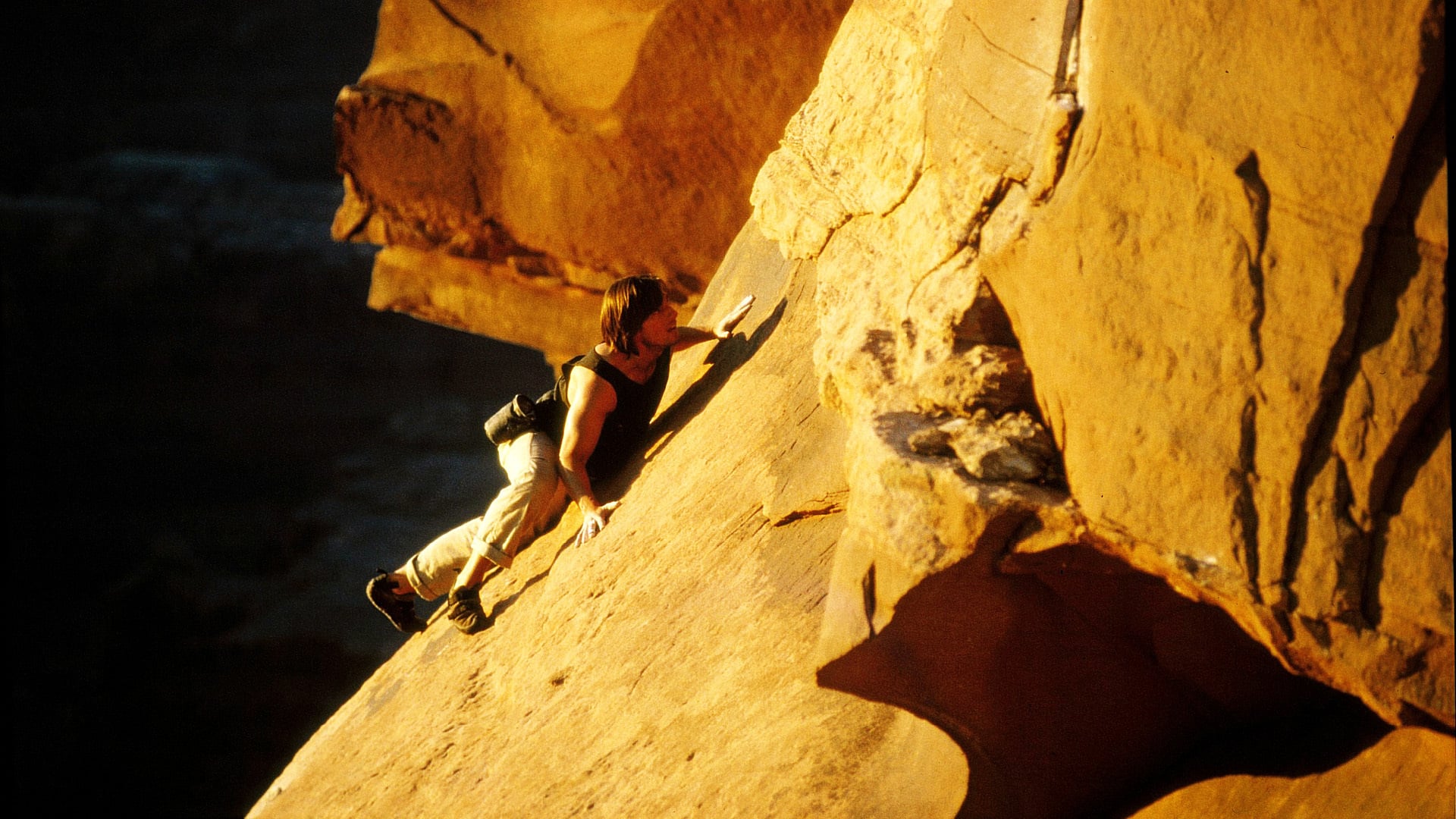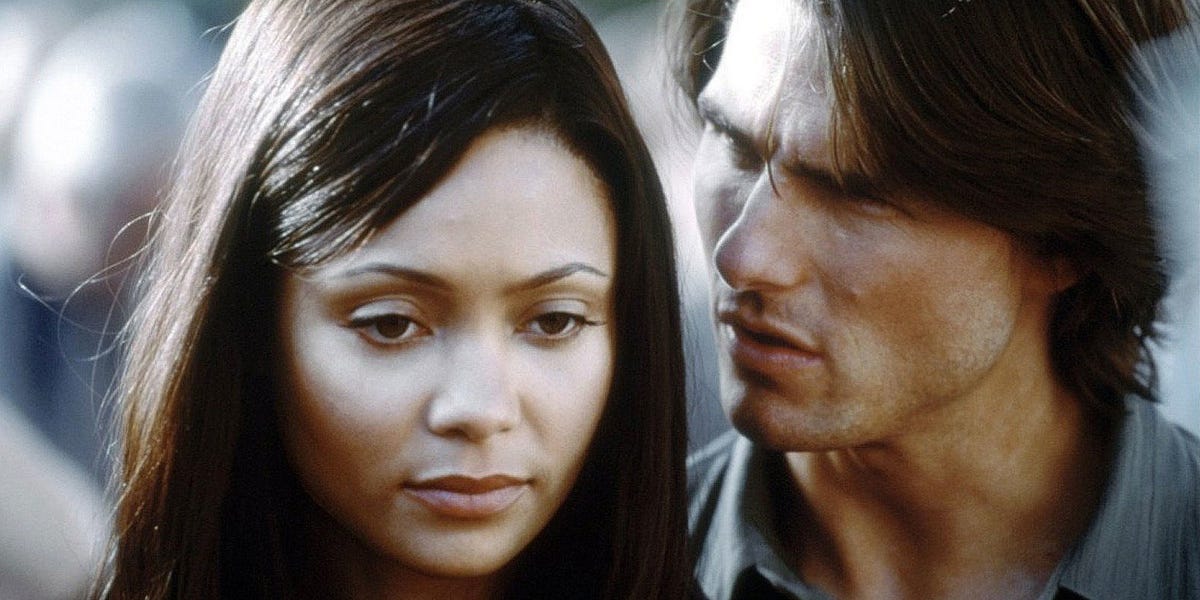Mission: Impossible II
After rewatching "Mission: Impossible II," even I realized how wrong I was about this electric sequel, featuring a Tom Cruise with more attitude, an introduction to more daring stunts, and a harsh look at masculinity.

✭✭✭
Director: John Woo
Starring: Tom Cruise, Thandie Newton, Dougray Scott, Ving Rhames, Anthony Hopkins, Brendan Gleeson
Release Year: 2000
'Mission: Impossible II' isn’t just Wrongfully Rotten, it deserves high praise.
The path that the Mission: Impossible movies have taken is quite similar to the recent path we saw from the last three Star Wars movies. The thrilling spy series began with an auteur putting his own stamp, his own style of theater into the story in the shape of a Brian De Palma film. The success of the first installment is a bit disjointed, where the premiere at Cannes wasn’t met with praise, the editing was messy, and through it all, De Palma found a way to make something out of nothing. For Mission: Impossible II, the thought was to bring in a director that knew how to shoot action movies. They looked no further than John Woo, a director that had proved himself both overseas and in the U.S., who knew how to make a successful action movie for the audiences. His resume included, Hard Target, Broken Arrow, and his American classic, Face/Off, which to this very day, lit a fire into the atmosphere of American action movies. Having John Woo make a Mission: Impossible movie seems like a no brainer now, but the reception from M:I-2 has been less than stellar; in fact it’s the lowest rated Tomato score out of the entire series at 57%. It’s safe to say that American audiences didn’t realize the kind of stories that John Woo likes to tell and the style of action that he creates. After rewatching Mission: Impossible II, even I realized how wrong I was about this electric sequel, featuring a Tom Cruise with more attitude, an introduction to more daring stunts, and a harsh look at masculinity. Mission: Impossible II isn’t just Wrongfully Rotten, it deserves high praise.
What makes M:I-2 different from the rest of the other M:I movies is its compact narrative set on a big scale. The skeleton of these movies is not different from one installment to the next, but when you lay them all out on your bed, like an assortment of weapons, it’s clear to see that M:I-2 is the one separated from the bunch. The set up is that Ethan Hunt (Tom Cruise) is still isolated, not so much as cemented with a team of spies, as much as the lone agent sent to do the job. Luther (Ving Rhames) is back and John Polson’s Billy Baird is obviously a sit in for what would eventually be Simon Pegg’s character, but their presence is more tech assistance than actual impacts to the IMF missions. The real story is a triangle between Hunt, Thandie Newton’s mysterious and sexy thief Nyah Hall, and the villain Sean Ambrose (Dougray Scott) with his pursuit to unleash a deadly virus on the world called Chimera. The goal becomes to neutralize the virus, but the subplot is a battle of egos; two men, both skilled at what they do, one pursuing to save the world, the other pursuing to destroy it, and in the middle the damsel they desperately want to win over. As one would expect, they shoot it out with gun fire, motorcycle chases, and fights on the beach.

A major separating factor for M:I-2 is that it’s not solely focused on the stunts. Granted, the film begins with Cruise’s character free climbing in the Arizona desert, using only his hands Free Solo-style, and starting a trend of Cruise joyfully risking his life in the series. However, there are no major set pieces of mass scale. No hanging on to the side of a massive jet, no climbing up tall buildings in Dubai, and no dangling from a rope outside a helicopter. In short, M:I-2 is about the characters. There’s more depth to Ethan Hunt this time. He’s broken up, fearful of his missions, and he’s also incredibly flawed. The other part is that Hunt is more vengeful, filled with anger, and forceful. He’s not so much of a stuntman, but a true agent, killing people for information, jumping out the side of a building to escape Ambrose’s goons, and toeing the line of what it takes to save the world. I gathered the sense that John Woo was trying to separate Ethan Hunt from the James Bond’s we’ve seen before, but make him an agent of skill, an agent of true heroics. Much later, Hunt would become a complete mix of Bond and Jason Bourne, but there’s no denying that Woo and Cruise established a character that was uniquely their own right there and then. The argument is there that M:I-2 establishes everything for Ethan Hunt going forward.
But why did audiences and critics not appreciate it at the release time? In a word? Style. The fast cutting, hazey scenery, and slow motion speed ramping was something completely foreign to American audiences. Yes, M:I-2 was one year after The Matrix, but it was still operating on the action of John Woo. The Hong Kong thriller is distinctly Woo’s style, where a man must fight an evil side, a side that exists deep inside himself, and not lose his integrity in the process. It was also an incredibly unique time in the career of Tom Cruise. It is a period that I would argue is his best, but certainly his riskiest. He went through the grueling process of Stanley Kubrick’s Eyes Wide Shut, delivered arguably his greatest performance in Paul Thomas Anderson’s Magnolia, before making M:I-2 and then moving on to Vanilla Sky and Minority Report. Looking back on it, we may never see Cruise make a collection of diverse, thespian inspired, and self reflecting projects. I certainly miss this kind of Tom Cruise today.

There’s also a matter of wacky things that may have hindered M:I-2 from becoming a hit with critics, such as the weird promos done with Ben Stiller during the MTV Movie Awards, or the Limp Bizkit remix of the Lalo Schifrin theme song. That might be the film's gravest sin. Or maybe it was just still not entirely what audiences were expecting. The De Palma Mission: Impossible set up the spy world, established the characters, and Woo, along with writers Ronald D. Moore, Brannon Braga, and Robert Towne, had all but erased that beginning. But making a movie successful depends on a lot of factors. M:I-2 has arguably the best villain of the series in Dougary Scott’s Ambrose, a man so cold that it set up a cavalcade of maniacal rogue agents. Thandie Newton’s Nyah Hall was a character and actor done wrong by Cruise and the studio, which was their loss considering she had the most sex appeal with Hunt. On top of all those factors, Mission: Impossible II is by far the most complex of the series. Without it, the Mission: Impossible series would be in a state of the Fast and the Furious series, where the characters never really matter, and the artistry falls more on the action than the narratives. Mission: Impossible III would be where the reigns are fully handed over to J.J. Abrams, with the studios needing a sure thing. They got what they wanted and the series has continued to get better and better, but none of that becomes a reality without John Woo and Mission: Impossible II. It’s by far a film deserving of being claimed "Wrongfully Rotten."


.png)

